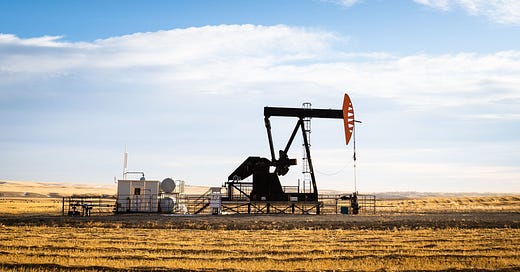Danielle Smith wants Alberta to lose, an allegory
Alberta must transition away from fossil fuels to remain an energy-producing powerhouse, but do you think Danielle Smith wants us to succeed? Nope.
Everyone in town knows the big grocery store must close. The store opened up nearly a century ago and is the reason the town became the bustling, prosperous society it is today, employing countless staff and contributing to the high standards of living most residents enjoy. It’s the only grocery store around, and generations of citizens share memories of shopping there.
So why on earth is the grocery store closing? Did demand take a dive cliff-side? On the contrary, more and more people are moving into town, and more and more people means more and more groceries. Demand has only gone up.
No. As it turns out, the store sells uniquely unhealthy food—not as in junk food, but natural, ordinary food that is downright toxic. The food is not just hazardous for consumers; the methods used to produce the food are dangerous for the environment as well as the processors. Everything about the grocery store is poisoning the town and the world beyond, and everyone knows it.
Most everyone knows it, anyway. There are those who stick their thumbs in their ears, lock their eyes shut, and deny reality. They say they will keep on buying groceries at that store until they die, and there is nothing anyone can do or say to change their mind. And yet, despite their protests, the store must cease operations if the town is to endure.
Some residents and institutions have successfully explored alternative methods to produce food safely: neighbourhood gardens here and there, sustainable fishing practices, that kind of thing. Some suggest the community should own these new means of production, instead of creating another privately-owned grocery store situation, but this is not a popular idea. The townsfolk are stubborn. They may have to rely on the grocery store until it closes, but those working on alternatives to fix the crisis understand the urgency.
Then—SNAP—the town’s newly elected mayor puts a stop to all that. Alternative food supply projects are officially paused for six months or more. The mayor says they must be careful with these new food sources, like the gardens, to ensure they aren’t dangerous or, even worse, not all that pretty to look at. She does not express the same apprehension regarding the undeniable misery and death caused by the grocery store, of course, and no thought is given to citizens who may starve if they refuse to slurp down the sludge on the store shelves.
It gets worse. The mayor went on to promise she will keep the grocery store open forever! She also sent a letter to her former high-school bully urging him to stop another town’s mayor from boycotting the store. Whether it stays open is out of their hands, but the grocery store defenders love what they hear, cognitively corrupted as they are by nostalgia and lead-based paint.
This is only the start of the new mayor’s strategic plan for the future. Who knows what’s next for the town? Some citizens have lost hope, but they must organize and act if they want to survive. Not even the mayor’s political opposition will do anything about it: they want to build a grocery store to tidewater.




